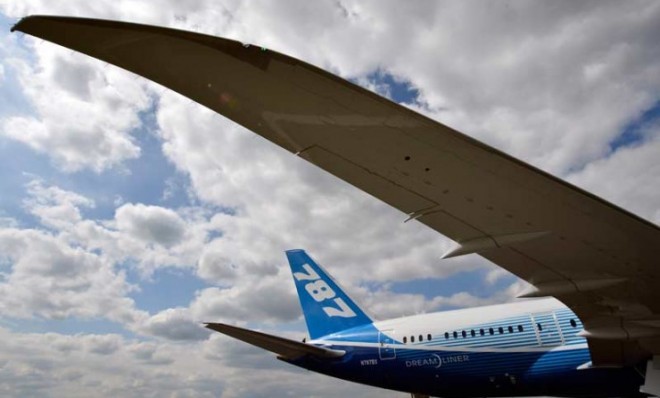Did Boeing's 787 Dreamliner get a green light because of lowered safety standards?
Reuters reports that the Japanese government eased safety regulations in 2008 to help fast-track the rollout of Boeing's signature plane


A free daily email with the biggest news stories of the day – and the best features from TheWeek.com
You are now subscribed
Your newsletter sign-up was successful
As governments around the world continue to investigate the grounded Boeing 787 Dreamliner for possible defects, a new report suggests that the troubled aircraft may have been the beneficiary of lowered safety standards in Japan. According to Mari Saito and Tim Kelly at Reuters:
Japan's government stepped in to give Boeing's now-grounded 787 Dreamliner and its made-in-Japan technology a boost in 2008 by easing safety regulations, fast-tracking the rollout of the groundbreaking jet for Japan's biggest airlines, according to records and participants in the process…
"I believe the request for the changes came initially from the airlines. Ultimately, it was a discussion of measures to lower operating costs for the airlines," said Masatoshi Harigae, head of aviation at Japan's Aerospace Exploration Agency, one of the outside advisers who urged the eased regulatory standards. [Reuters]
Boeing and the Japanese airlines that use Dreamliners have not commented on Reuters' report. The Japanese government says the rule changes were made for "pragmatic" reasons that brought the country's safety regulations more in line with global standards.
Reuters reports that there is so far no link between the lowered standards and problems with the Dreamliner's lithium-ion battery, a cutting-edge piece of equipment that is reportedly being heavily scrutinized by air safety officials. The battery significantly lowers the Dreamliner's fuel costs, but one battery caught fire in early January on the tarmac at Boston's Logan airport, while a malfunction in another battery later in the month forced an All Nippon Airways flight to make an emergency landing in Japan.
The Week
Escape your echo chamber. Get the facts behind the news, plus analysis from multiple perspectives.

Sign up for The Week's Free Newsletters
From our morning news briefing to a weekly Good News Newsletter, get the best of The Week delivered directly to your inbox.
From our morning news briefing to a weekly Good News Newsletter, get the best of The Week delivered directly to your inbox.
However, the rule changes — which reportedly included scrubbing requirements that each jet be inspected by ground crew after every flight — reflects just how involved Japanese airlines and corporations were in speeding up the construction of the aircraft, and how the Dreamliner's outsourced manufacturing model has led to a series of headaches for U.S.-based Boeing. According to David M. Ewalt at Forbes:
While each 787 was assembled at Boeing’s plant in Everett, Washington, more than 70 percent of the jets' individual components were outsourced to some 900 subcontractors all over the world. The auxiliary power unit alone contains parts from GS Yuasa, France's Thales Group and North Carolina-based UTC Aerospace Systems, a subsidiary of Connecticut's United Technologies.
An unusually high level of subcontracted manufacturing has made it more difficult to track down the jets' problem, and an overly complex — and sometimes patchy — safety net could have contributed to it happening in the first place. [Forbes]
Indeed, Japanese companies are responsible for about 35 percent of the average Dreamliner, making its fate a source of anxiety for Japan's industrial sector. As James Surowiecki at The New Yorker notes, the plane's complex supply chain ended up leading to endemic delays and costing Boeing far more than if it had simply built the plane itself.
Japanese regulators are not the only ones under scrutiny. The Dreamliner's battery was approved by the Federal Aviation Administration in 2007, but the recent malfunctions suggest another review may be necessary, says the editorial board at USA Today:
You don't need to be an expert to look at the photos of charred batteries and know that some of the safeguards are failing. The "multiple systems" to prevent just this sort of event "did not work as intended," Deborah Hersman, chairman of the National Transportation Safety Board, said Thursday of the incident in Boston. In blunt language, Hersman said the "expectation in aviation is never to experience a fire on an aircraft." [USA Today]
A free daily email with the biggest news stories of the day – and the best features from TheWeek.com
Ryu Spaeth is deputy editor at TheWeek.com. Follow him on Twitter.
-
 Switzerland could vote to cap its population
Switzerland could vote to cap its populationUnder the Radar Swiss People’s Party proposes referendum on radical anti-immigration measure to limit residents to 10 million
-
 Political cartoons for February 15
Political cartoons for February 15Cartoons Sunday's political cartoons include political ventriloquism, Europe in the middle, and more
-
 The broken water companies failing England and Wales
The broken water companies failing England and WalesExplainer With rising bills, deteriorating river health and a lack of investment, regulators face an uphill battle to stabilise the industry